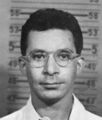Template:Selected anniversaries/December 1: Difference between revisions
No edit summary |
No edit summary |
||
| (28 intermediate revisions by the same user not shown) | |||
| Line 1: | Line 1: | ||
<gallery> | <gallery> | ||
|| | File:Johann Gabriel Doppelmayr.jpg|link=Johann Gabriel Doppelmayr (nonfiction)|1750: Mathematician, astronomer, and cartographer [[Johann Gabriel Doppelmayr (nonfiction)|Johann Gabriel Doppelmayr]] dies. He published works on mathematics and astronomy, including sundials, spherical trigonometry, and celestial maps and globes, along with biographical information on several hundred mathematicians and instrument makers. | ||
File:Louis Slotin.jpg|link=Louis Slotin (nonfiction)|1910: Physicist [[Louis Slotin (nonfiction)|Louis Slotin]] born. He will be fatally irradiated in a criticality incident during an experiment with the "demon core" at Los Alamos National Laboratory. | |||
File:Louis Slotin.jpg|link=Louis Slotin (nonfiction)|1910: Physicist [[Louis Slotin (nonfiction)|Louis Slotin]] born. He will be fatally irradiated in a criticality incident during an experiment with the demon core at Los Alamos National Laboratory | |||
File:Aleister Crowley.jpg|link=Aleister Crowley (nonfiction)|1947: Magician and author [[Aleister Crowley (nonfiction)|Aleister Crowley]] dies. He gained widespread notoriety during his lifetime, as a recreational drug experimenter, bisexual, and an individualist social critic; the popular press denounced him as "the wickedest man in the world" and a Satanist. | File:Aleister Crowley.jpg|link=Aleister Crowley (nonfiction)|1947: Magician and author [[Aleister Crowley (nonfiction)|Aleister Crowley]] dies. He gained widespread notoriety during his lifetime, as a recreational drug experimenter, bisexual, and an individualist social critic; the popular press denounced him as "the wickedest man in the world" and a Satanist. | ||
File: | File:Somerton_Man.jpg|link=Tamam Shud case (nonfiction)|1948: [[Tamam Shud case (nonfiction)|Tamam Shud case]]: an unidentified man is found dead at 6:30 am, 1 December 1948, on Somerton beach, Glenelg, just south of Adelaide, South Australia. Public interest in the case remains significant for several reasons: the death occurred at a time of heightened international tensions following the beginning of the Cold War; the apparent involvement of a secret code; the possible use of an undetectable poison; and the inability of authorities to identify the dead man. | ||
|| | File:Stellated Octahedron Day.jpg|link=Stellated Octahedron Day|1967: First known occurence of '''''[[Stellated Octahedron Day]]''''' (December 1) celebrating the stellated octahedron, the only stellation of the octahedron. | ||
File:1969 draft lottery scatterplot.svg|link=Draft lottery (1969) (nonfiction)|1969: The first [[Draft lottery (1969) (nonfiction)|draft lottery]] in the United States is held since World War II. | File:1969 draft lottery scatterplot.svg|link=Draft lottery (1969) (nonfiction)|1969: The first [[Draft lottery (1969) (nonfiction)|draft lottery]] in the United States is held since World War II. | ||
</gallery> | </gallery> | ||
Latest revision as of 06:43, 17 April 2022
1750: Mathematician, astronomer, and cartographer Johann Gabriel Doppelmayr dies. He published works on mathematics and astronomy, including sundials, spherical trigonometry, and celestial maps and globes, along with biographical information on several hundred mathematicians and instrument makers.
1910: Physicist Louis Slotin born. He will be fatally irradiated in a criticality incident during an experiment with the "demon core" at Los Alamos National Laboratory.
1947: Magician and author Aleister Crowley dies. He gained widespread notoriety during his lifetime, as a recreational drug experimenter, bisexual, and an individualist social critic; the popular press denounced him as "the wickedest man in the world" and a Satanist.
1948: Tamam Shud case: an unidentified man is found dead at 6:30 am, 1 December 1948, on Somerton beach, Glenelg, just south of Adelaide, South Australia. Public interest in the case remains significant for several reasons: the death occurred at a time of heightened international tensions following the beginning of the Cold War; the apparent involvement of a secret code; the possible use of an undetectable poison; and the inability of authorities to identify the dead man.
1967: First known occurence of Stellated Octahedron Day (December 1) celebrating the stellated octahedron, the only stellation of the octahedron.
1969: The first draft lottery in the United States is held since World War II.





